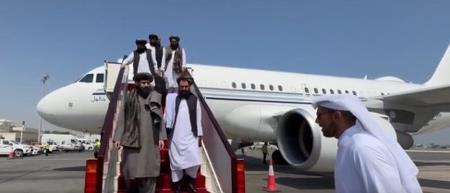
Afghanistan's Defence Minister Arrives In Doha For Negotiations With Pakistan
This crucial visit comes in the backdrop of deteriorating ties between Afghanistan and Pakistan as Islamabad continues to use military force to attack several areas in Kabul, which has led to deaths of many civilians, including children and women.
According to several reports, nearly 200 Afghans have lost their lives in these attacks while nearly 60 Pakistan soldiers have also been killed.
The Qatar-mediated negotiations between Afghanistan and Pakistan take place amid an extended, but uneasy truce. Afghans along the Durand Line continue to be targetted by the Pakistani forces even after the two neighbours had agreed to a ceasefire folllowing a fierce battle last week.
Late Friday, Pakistan conducted air strikes in three locations in Paktika province, according to reports.
The bombing, which has killed at least 17 people, including three Afghan cricketers, broke the temporary ceasefire agreed upon by the two sides on Wednesday, October 15.
Islamabad had earlier too carried out similar attacks within Afghanistan, including the capital Kabul.
There has been no confirmed report of Islamabad having issued a formal apology for the deaths of the Afghan cricketers or other civilian casualties.
The attack occurred at around 8:30 pm local time in Khandaro village of Argun district, where a Pakistani jet targetted a house. The airstrike also injured 16 others, including women and children, according to the several reports.
Notably, these attacks initiated by the Pakistani side intensified after the visit of Afghan Foreign Minister Amir Khan Muttaqi to New Delhi last week.
The absence of an apology complicates the diplomatic environment in Doha by hardening Afghan public opinion against Pakistan and increasing pressure on Taliban negotiators to extract formal concessions or guarantees rather than accept a face-saving, non-binding statement.
The Pakistan delegation comprises Pakistan's Defence Minister Khawaja Asif and intelligence chief Asim Malik, known as Taliban baiters in recent times.
Asif has been repeatedly alleging that the Taliban have“aligned with India,” while Pakistan's Foreign Ministry claimed that Afghanistan has become a“hub for transnational terrorism”.
How much Pakistan will be able to convince Kabul's delegation, led by Afghanistan's Defense Minister Mullah Mohammad Yaqub Mujahid and the head of the country's intelligence agency, Abdul Haq Wasiq, is a matter to be awaited.
Regional actors pushed for the meeting after a week of cross-border violence and Pakistani airstrikes that followed a short 48-hour ceasefire, which was reportedly extended for the Doha talks.
Qatar occupies a unique mediating role in Afghan diplomacy and security diplomacy between Islamabad and Kabul after the Taliban's return to power.

Legal Disclaimer:
MENAFN provides the
information “as is” without warranty of any kind. We do not accept
any responsibility or liability for the accuracy, content, images,
videos, licenses, completeness, legality, or reliability of the information
contained in this article. If you have any complaints or copyright
issues related to this article, kindly contact the provider above.


















Comments
No comment